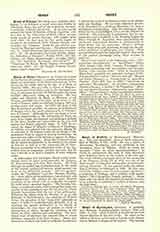

Henry of Ghent (HENRICUS DE GANDAVO, known as the DOCTOR SOLEMNIS), a notable scholastic philosopher and theologian of the thirteenth century, better known by his works than by his life; d. at Paris or Tournai, 1293. He was born at Ghent in Belgium. The exact year of his birth, early in the thirteenth century, is unknown, as is also his family name, the name Goethals (Bonicollii) being an invention. He was called also Henricus de Muda or Mudanus or ad Plagam, probably from his place of residence in the town of Tournai, where we find him living in 1267 as a secular priest and canon. In 1276, the date of his first disputatio de quodlibet, he appears as Archdeacon of Bruges, and a few years subsequently as Archdeacon of Tournai. Although he does not seem to have resided permanently at the University of Paris, he must have taught for frequent and prolonged periods at the great intellectual metropolis, for he was well known and highly esteemed there. In 1277 he received the degree of Magister or Doctor of Theology. In 1282 he was selected with two others by Martin IV to arbitrate in the dispute about the privileges of the mendicant friars in regard to hearing confessions: he defended the rights of the bishops as against St. Bona-venture and the regulars. From this to the end of his life he figured prominently in the ecclesiastical affairs of Tournai as well as in the university life of Paris. Recent researches have eliminated much of the legendary from his biography, notably the story that he was a Servite or at least a member of some religious order.
As philosopher and theologian Henry ranks immediately below his great contemporaries, St. Thomas, St. Bonaventure, and John Duns Scotus. He lived through the golden age of Scholasticism, in the midst of the intense intellectual activity which marked the close of the thirteenth century. His two greatest works, the “Quodlibeta” and the “Summa Theologica”, show him to be by preference a psychologist and metaphysician. He treated all the great debated questions of the schools with an originality that gives his work quite a personal impress. His doctrine, too, forms a consistent whole, with perhaps the single exception of his teaching on the Divina Scientia, which scarcely harmonizes with the rest of his philosophy. Wherever he differs from St. Thomas (e.g. on the Principle of Individuation, the existence of Materia Prima, the plurality of the “formative” principle in man), or from his contemporaries generally (e.g. in rejecting the species intelligibilis in his theory of knowledge), his own views are seldom as sound or satisfactory as theirs, though his criticisms of the latter are often vigorous and convincing. His occasional want of clearness has exposed him to severe criticism, especially from Duns Scotus. Hence also some have claimed, but without sufficient foundation, to detect the seeds of unorthodox views in his philosophy and theology. He has been somewhat persistently described as a medieval Platonist, but such a description is misleading. Like the other great scholastics he was an intelligent, not a servile, follower of Aristotle. His philosophy is peripatetic, but he supplemented and completed it by drawing largely on Plato through St. Augustine, thus transmitting the wholesome Augustinian element in Scholasticism to Duns Scotus and his successors. Henry’s writings reflect much deep and searching thought on the perennial problems of philosophy and religion. Their perusal will persuade the impartial inquirer that much of our modern knowledge about these matters is medieval.
Henry is the author of the following works: “Disputationes Quodlibetales” or “Quodlibeta” (Paris, 1518; Venice, 1608, 1613; “Summa Theologica,” incomplete, containing only the prologue and theodicy (Ghent, 1520; Ferrara, 1646); “Liber de Scriptoribus Illustribus”, probably not authentic (Cologne, 1580). Still unpublished: a short “Treatise on Logic” (Bruges and Erfurt libraries); a “Commentary on Aristotle‘s Physics” (Paris, Bib. Nat., n. 1660); “Questions on Aristotle‘s Metaphysics“, of doubtful authenticity (Escorial library); a treatise “De Virginitate” (Brussels and Berlin libraries); “Quaestiones super Decretalibus” (Vienna library); many unpublished sermons.
P. COFFEY

